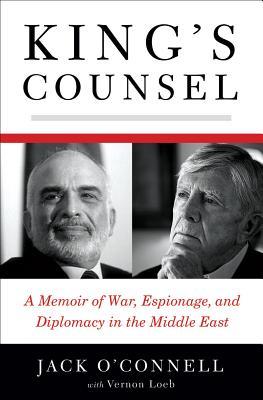|
15 NOVEMBER 2012
| KING'S COUNSEL: JACK O'CONNELL'S MEMOIR OF ESPIONAGE AND DIPLOMACY IN THE
MIDDLE EAST
|
"I arrived at Cairo International Airport at 11pm on a weeknight and went directly to my hotel. There was no one in the lobby and one reception clerk
on duty. I showed him my passport and he found my reservation. Then out of the blue he looked up and asked, 'Did you come from CIA?' My mind went blank.
I looked down at the front of my jacket to see if I'd put my agency badge on by mistake. Nothing. I thought of grabbing my only bag and running out of
the hotel, but was literally too paralyzed to move or answer him. He just stood there looking at me quizzically. How did he know? Was he tipped off by
the Egyptian Security Service? If so, where were they? As my mind raced in senseless circles, I heard him repeat the question: 'Did you come from
CIA?'
"I paid no attention. My career was probably ruined before it had even begun. Should I finish the mission or get in touch with my emergency contact?
Not if I was already a marked man. Obviously irritated that I did not respond to his question, the clerk repeated in a louder voice: 'Mister, did you
come from CIA -- from Cairo International Airport?' I almost fainted from the shock -- and relief -- as I blurted out, 'Of course! How else could I
have gotten here?'"
That's in the introduction of the book.
Actually, Jack O'Connell needed no introduction after decades of service in the Middle East. Any real insider of diplomacy and conflict in that
tormented region knew how close the cool, calm, and well-informed American was to King Hussein of Jordan. Whether you supported His Majesty or
opposed him, whether you were a mere innocent bystander or an activist on behalf of one cause or another; it was always prudent to consider that King
Hussein was perhaps the most informed Monarch in the company of a very less-informed lot. Always courteous -- he would address you as "Sir" -- although
he was not only King but a direct descendent of the Prophet's family. A "Sherif" with an uneasy throne, he remained at the center of breathtaking
events. What happened during the 1967 Six Day War? How did Henry Kissinger use the 1973 Yom Kippur war to jumpstart the peace process? How did a
single "foreigner" become so crucial to a very sharp Monarch and how did that Monarch become America's most reliable ally?
The relationship started upon arrival in Amman in 1958, when the young "diplomat" uncovered and helped block a coup against the young King.
That was the beginning of a very interesting relationship. O'Connell explains that King Hussein, "the only bona fide peacemaker" wanted simply the
return of the West Bank seized during the 1967 Six Day War. "Despite American promises, the clear directive of U.N. Resolution 242 and years of
secret negotiations with Israel," that never happened. The King's dying wish, O'Connell adds, was that he tell the unknown story. He did, in time. Jack
O'Connell passed away in 2010. He was able to complete it with Vernon Loeb, Deputy Managing Editor of The Philadelphia Inquirer, who had covered the CIA
and Pentagon and reported on the 2003 invasion of Iraq.

|

